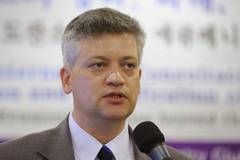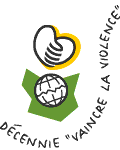The road to reunification is obstructed by potholes

Dr Leonid A. Petrov, a University of Sydney professor and specialist on Korea, explained that the language used in describing the situations in both the Korean states requires a high level of sensitivity for the sake of avoiding more misunderstandings.
If there were an easy path toward the reunification of Korea, it might have been discovered during the past 25 years or at least since the Cold War ended in the late 1980s. But it hasn't been found yet.
In 1984 the World Council of Churches (WCC) began the Tozanso Process with the modest goal of bringing Christians from North and South Korea to the same table in order to build relationships and slowly chip away at structures perpetuating a painful division resulting from the Korean War, the Cold War and starkly differing ideologies.
Twenty-five years later, an international consultation is being held in Hong Kong to celebrate that new beginning, jointly organized by the WCC and the Christian Conference of Asia. The question is not whether there have been accomplishments resulting from the Tozanso Process. The fact that there is a 25th year to celebrate is an accomplishment in and of itself.
At the same time, the WCC and its member churches are asking what the next steps should be for the ecumenical community, given that North and South Korea remain divided.
The division, particularly within the context of the churches in both countries, is not as deep as it was a quarter century ago. But as with peeling the proverbial onion, each layer reveals more and more challenging detail, including issues of historical grievances, colonialism, occupation, war, injustice, power imbalance, fear and conflict.
During the second day of discussions at the International Consultation on Reconciliation and Reunification of the Korean Peninsula, a series of speakers laid out just how complicated and challenging this process continues to be.
The conference is being attended by nearly 140 church leaders from more than 30 countries with the goals of celebrating the Tozanso Process and setting a direction for the future role of the ecumenical community in Korean reunification.
None of the day's speakers disagreed with the proposition that there is a path forward. The question was which path should be taken, and where it would lead. How one reaches the goal and how one speaks about that goal can be equally important.
“There are numerous unresolved issues,” said Dr Leonid A. Petrov, a University of Sydney professor and specialist on Korea, during a presentation. He explained that the language used in describing the situations in both the Korean states requires a high level of sensitivity for the sake of avoiding more misunderstandings.
Most of the presentations, including Petrov's, wrestled with the geo-politics of the region. It took the intervention of North Korean pastor the Rev. Ri Rong Ji to call the group back to the primary task of the consultation: discovering the role of the church in bringing about peace, reconciliation and reunification in Korea. That is what his delegation of four North Koreans was hoping to hear.
While it is certain the discussions will eventually focus on the role of the church, the speakers on Thursday did present a certain realism that the Korean division is not just found along a demilitarized zone separating the two nations, but goes much deeper, reaching into the soul of Korea itself, with regional and world political posturing swirling around the issue.
It is not surprising that these divisions are found around the table of the Six Party Talks, and in the academic interpretations of regional political analysts influenced by the security needs of each country involved in the situation.
Whose problem is the division of the Korean peninsula? Of course, the Koreans from north and south live with the deep and often overlooked pain and hardship of their separation. But the causes behind the division also rest in the hands of the main protagonists in this tortured storyline: China, Russia, the United States and Japan. Along with North and South Korea, these players account for the power groups making up the Six Party Talks.
The seven presentations on the second day of the consultation included perspectives on peace, reconciliation and reunification from the Chinese, Russian and Japanese contexts, analyses of multilateral security and intra-Korean cooperation, and a historical overview of the beginnings of the Tozanso Process by the former director of the WCC's Commission of the Churches on International Affairs, Ninan Koshy, who organized the first Tozanso Consultation in 1984.
Yet none of the speakers could offer definite answers on the future.
Only a decade ago reunification appeared to be well on course. However, South Korea's Sunshine Policy of engagement with North Korea, adopted in the late 1990s, has been suspended under the current government. Economic cooperation between north and south has lessened, there are more restrictions on entering North Korea, and suspicions have emerged from the Six Party Talks.
Some in the meeting, who are not Koreans, voiced concern as to whether it is realistic even to consider Korean reunification today, particularly given the vast economic disparity between the two nations. South Korea is one of the top ten industrial countries in the world and in 2010 will be hosting the G-20.
The economy of North Korea has been under enormous stress since funding from China and Russia disappeared after the end of the Cold War. Its most loyal allies have made strides toward market economies.
Despite a day filled with presentations that had the potential to emphasize challenges, the moderator of the final session, the Rev. Dr Yoon Jae Chang of South Korea, echoed the sentiment expressed by the Rev. Ri Rong Ji from North Korea earlier in the day by focusing the group on their task at hand: “How can we continue our Christian mission to love?”
"Churches support Korean reunification at Hong Kong consultation"
"Kobia and WCC delegation meet North Korean president Kim Yong-nam"
"Nurture our unity in Christ, Kobia tells North Korean congregation"
WCC programme on Public witness: addressing power, affirming peace



